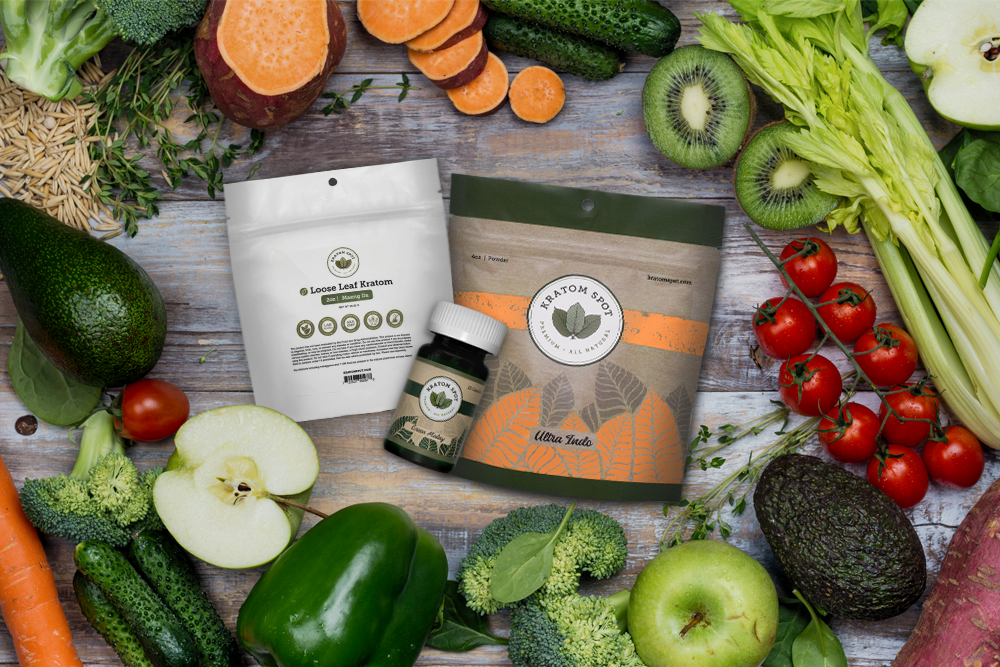
Common Alkaloids in Food
If you’ve been in the kratom community for long, odds are you’ve run into the term “alkaloids” a time or two. Indeed, kratom’s alkaloids are the natural compounds responsible for kratom’s unique effects. But kratom isn’t the only source of alkaloids: there are alkaloids in food we eat every day!
In this article, we examine foods high in alkaloids, the alkaloids they contain, and how these naturally occurring compounds form an essential and enjoyable part of our diet. Let’s dive right in!
What are Alkaloids?
Alkaloids are a class of naturally occurring compounds that are produced by many plants, especially nightshade vegetables.
Unlike many other phytochemicals (natural compounds produced by plants), alkaloids tend to have a very pronounced effect when ingested by humans. Some may cause stimulation (caffeine, for instance), others intoxication (cocaine), and some can even be toxic (solanine)!
Are Alkaloids Good for You? Bad for You?
Some alkaloids are good for you, and others are bad for you.
Alkaloids’ effects are as diverse as the plants that produce them, and many are enjoyable, healthy, and important parts of the food we eat every day. By contrast, others can be intoxicating or even harmful if ingested.
But the alkaloids in food are, generally, nothing to worry about. In fact, many foods high in alkaloids are “intrinsic part[s] of the regular Western diet”, making up an essential part of our food supply and nutrients!
The following list covers some of the most important alkaloids in food. We’ll also include a few potentially harmful food alkaloids, with an overview of what to look out for.
Foods High in Alkaloids
The list below is far from exhaustive, but it covers several of the most common, enjoyable, and important alkaloids in food.
Peppers
Peppers, and especially chili peppers, produce an alkaloid known as capsaicin. Capsaicin is responsible for the spicy taste of chili pepper and is a celebrated part of many cultures’ diets.
If it is applied to the skin or the eyes, capsaicin can cause an unpleasant irritation. In fact, capsaicin is the primary ingredient in pepper spray, which is used as a self-defense tool.
Researchers speculate that capsaicin evolved as the peppers primary defense against insects, birds, and other predators. But despite that, capsaicin is generally safe for consumption. But beware: that spicy flavor can certainly pack a punch!
Coffee
Coffee, a relative of the kratom plant, is one of the most popular beverages in America, where it is used for an energizing pick-me-up. The secret? The alkaloid known as caffeine.
Caffeine is mainly used for its stimulating effect, though several sodas and food products also use caffeine for its flavor.
Small-to-moderate doses of caffeine are generally considered safe for otherwise healthy individuals. However, too much caffeine can lead to an upset stomach, diarrhea, and other gastro-intestinal distress! Ask any coffee drinker and they’ll tell you: don’t overdo your caffeine intake!
Tea Leaves
Just like coffee, tea leaves (and the tea made from them) are a rich source of alkaloids! There are two primary alkaloids in tea: caffeine (see section on coffee) and theophylline.
When enjoying tea, the most prevalent alkaloid is undoubtedly caffeine. However, the theophylline it contains is also an important food alkaloid with several medical applications.
When isolated, theophylline is used as the active ingredient in several medications. Theophylline can relax air passages in the lungs, making it easier to breathe. As such, theophylline-based medications are useful for treating bronchitis, asthma, emphysema, and a number of other lung ailments.
Tomatoes
Tomatoes produce the alkaloid known as tomatine. This food alkaloid is primarily found in the stem and other inedible portions of the plant, but the fruit itself does produce small amounts.
Notably, high doses of tomatine are toxic to humans! But worry not, tomato lovers: the delicious fruit of the tomato plant contains such small amounts that there’s no need to fear tomatoes’ alkaloids. In foods such as salads, pizza, or any other dish, enjoy your tomatoes without worry!
Black Pepper
Black pepper is famous for its unique, pleasantly biting taste. But that delightful flavor is really the result of a unique alkaloid known as piperine.
Piperine is principally used for its flavor profile. Ask any chef, and they’ll tell you that black pepper is one of the most commonly used and essential spices you’ll find in the kitchen!
But piperine isn’t just good tasting, it’s also good for your health! Piperine has a number of important functions, especially for fighting chronic diseases. For instance, piperine can lower insulin resistance and can fight inflammation, which is responsible for discomfort and a number of severe complications of many common diseases!
Tonic Water
Tonic water is a favorite of barflies the world over, enjoyed with a snifter of gin or alone for its effervescent bubbles and distinctive taste. But did you know that that taste is the result of the alkaloid quinine?
Quinine is extracted from the bark of the cinchona tree. When ingested, it has a number of effects on the body. At very high doses, quinine can actually be toxic. However, these doses are much higher than reasonably possible through ingesting tonic water. At moderate doses, quinine actually has a number of therapeutic uses!
For instance, quinine is an important tool for preventing and treating malaria. In smaller doses, it is also used for treating muscle cramps and as a non-narcotic reliever.
Potatoes
When they’re grown under normal conditions, potatoes actually do not contain much in the way of alkaloids. But when developing potatoes are exposed to sunlight, they can turn green and produce an alkaloid known as solanine.
Unlike many alkaloids, solanine is quite toxic to humans and should not be consumed directly. For this reason, always discard green potatoes!
However, medical science has developed a number of therapeutic uses for solanine. It has anticonvulsant and mild sedative properties and has been used as an active ingredient in cough and cold medicines and for treating asthma.
The Alkaloids in Kratom
Kratom produces a number of its own unique alkaloids, which are responsible for kratom’s unique array of effects.
The two main kratom alkaloids are mitragynine and 7-hydroxymitragynine. Just like the alkaloids in food, each kratom alkaloid has a different effect, and the proportions of each are the main difference between kratom strains.
For more information, be sure to check out our Guide to Kratom’s Alkaloids.
But in the meantime, we hope that this article has fostered a bit more appreciation for the alkaloids in food. These unsung heroes of the food world are responsible for some of our favorite flavors — and for a number of impressive therapeutic effects!

